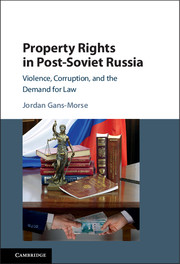Book contents
- Frontmatter
- Contents
- List of Tables
- List of Figures
- Acknowledgments
- 1 Violence, Corruption, and Demand for Law
- 2 Institutional Supply and Demand
- 3 The Evolution of FirmStrategies
- 4 The Role of State Legal Capacity
- 5 Demand-Side Barriers to the Use of Legal Strategies
- 6 The Effectiveness of Illegal Strategies
- 7 Variation in Strategies across Firms
- 8 Firms, States, and the Rule of Law in Comparative Perspective
- Appendices
- References
- Index
8 - Firms, States, and the Rule of Law in Comparative Perspective
Published online by Cambridge University Press: 13 July 2017
- Frontmatter
- Contents
- List of Tables
- List of Figures
- Acknowledgments
- 1 Violence, Corruption, and Demand for Law
- 2 Institutional Supply and Demand
- 3 The Evolution of FirmStrategies
- 4 The Role of State Legal Capacity
- 5 Demand-Side Barriers to the Use of Legal Strategies
- 6 The Effectiveness of Illegal Strategies
- 7 Variation in Strategies across Firms
- 8 Firms, States, and the Rule of Law in Comparative Perspective
- Appendices
- References
- Index
Summary
This book has introduced a theory of institutional demand and an analytical framework to integrate the demand and supply sides of property security. In contrast to existing studies’ focus on the conditions under which rulers seek to create effective institutions, this book's framework sets forth a distinctly different approach by emphasizing firms’ role in the development of effective institutions.
The theory elucidates the relationships between three key explanatory factors and the outcome this book has sought to explain – firms’ strategies for securing property. First, state legal capacity is necessary but insufficient to induce firms’ use of formal legal institutions: While a dearth of state legal capacity impedes firms’ use of law, improved capacity frequently does not increase firms’ willingness to utilize formal legal institutions. Second, firms’ increasing reliance on formal legal institutions frequently occurs in the absence of heightened state legal capacity. In such cases, two factors other than state legal capacity largely determine whether firms utilize violence and corruption or whether firms turn to law: the prevalence of demand-side barriers to using formal legal institutions and the effectiveness of illegal strategies for securing property.
The first section of this concluding chapter briefly recounts the book's central arguments and summarizes the empirical evidence presented in preceding chapters. The chapter then examines the relationships between firms’ property security strategies, the effectiveness of state institutions, and the broader concept of the rule of law. With this broader picture in mind, the chapter turns to the prospects for property security and the rule of law in Russia. Finally, the chapter places the book's central arguments in comparative perspective, considering pathways to the rule of law under various historical and contemporary circumstances.
The Argument in Brief
Chapter 2 developed the analytical framework described above and introduced the study's dependent variable: firm strategies for resolving conflicts related to acquiring assets, protecting property, and enforcing contracts – a concept I refer to as property security strategies. All strategies – legal or illegal – ultimately rely on coercion as a last resort (Umbeck, 1981, p. 9; Ellickson, 1991, p. 175). The only question is whether this coercion is supplied by the state in accordance with formal rules, or whether a strategy relies on coercion supplied by private actors or by state actors illicitly employing state resources.
- Type
- Chapter
- Information
- Property Rights in Post-Soviet RussiaViolence, Corruption, and the Demand for Law, pp. 179 - 206Publisher: Cambridge University PressPrint publication year: 2017



